鲁教版七年级上英语各单元知识点总结
鲁教版七年级英语上册Unit4-6知识点
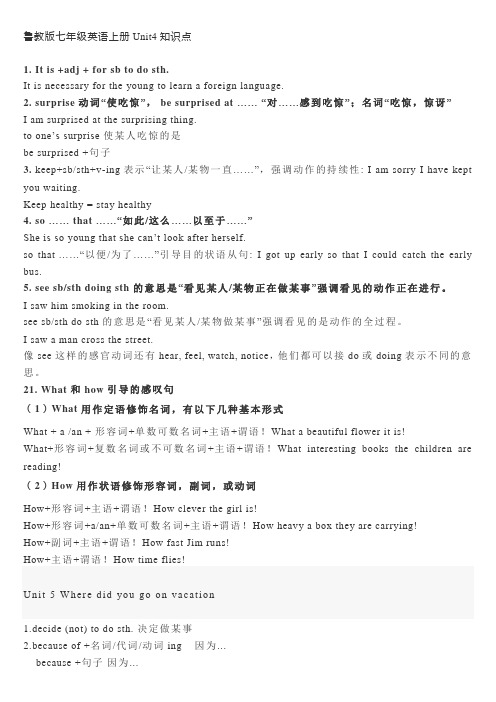
鲁教版七年级英语上册Unit4知识点1. It is +adj +for sb to do sth.It is necessary for the young to learn a foreign language.2. surprise动词“使吃惊”,be surprised at…… “对……感到吃惊”;名词“吃惊,惊讶”I am surprised at the surprising thing.to one’s surprise使某人吃惊的是be surprised +句子3. keep+sb/sth+v-ing表示“让某人/某物一直……”,强调动作的持续性: I am sorry I have kept you waiting.Keep healthy = stay healthy4. so……that……“如此/这么……以至于……”She is so young that she can’t look after herself.so that ……“以便/为了……”引导目的状语从句: I got up early so that I could catch the early bus.5. see sb/sth doing sth的意思是“看见某人/某物正在做某事”强调看见的动作正在进行。
I saw him smoking in the room.see sb/sth do sth的意思是“看见某人/某物做某事”强调看见的是动作的全过程。
I saw a man cross the street.像see这样的感官动词还有hear, feel, watch, notice,他们都可以接do或doing表示不同的意思。
21. What和how引导的感叹句(1)What用作定语修饰名词,有以下几种基本形式What + a /an + 形容词+单数可数名词+主语+谓语!What a beautiful flower it is!What+形容词+复数名词或不可数名词+主语+谓语!What interesting books the children are reading!(2)How用作状语修饰形容词,副词,或动词How+形容词+主语+谓语!How clever the girl is!How+形容词+a/an+单数可数名词+主语+谓语!How heavy a box they are carrying!How+副词+主语+谓语!How fast Jim runs!How+主语+谓语!How time flies!U n i t5 W h er e d i d yo u go on v a c at i on1.decide (not) to do sth. 决定做某事2.because of +名词/代词/动词ing 因为...because +句子因为...3. try (not) to do sth. 尽力(不)做某事try doing sth. 试着做某事4. enjoy doing sth. 喜欢做某事5. arrive in + 大地点到达...arrive at + 小地点到达...get to + 地点到达...6. keep doing sth. 继续/重复做某事7. too many + 可数名词复数太多...too much + 不可数名词太多..much too=very +adj .8. so + 形容词/副词 + that从句如此... 以至于...9. forget to do sth. 忘记要做某事(事情还没做)forget doing sth. 忘记做过某事(事情已经做过了)10.something special 一些特别的东西someone interesting 一些有趣的人11.start to do 开始干某事(还没干)start doing 开始干某事(已经做了)12不定代词+形容词something good13.enough +n. enough moneyAdj +enough old enough14.as…as 像…一样;同…一样Run as fast as you can.你尽量快跑。
七年级上英语知识点鲁教版

七年级上英语知识点鲁教版作为初中阶段的英语教学重要组成部分,七年级上的英语知识点是学生从英语初学者向初级学习者转化的阶段,掌握这一部分知识对于未来的英语学习和综合能力提高至关重要。
本文将结合鲁教版的教材,详细介绍七年级上英语知识点。
一、基础语法在初学英语的阶段,语法是最基础的部分,以下是七年级上的英语语法点:1. 简单现在时2. 一般过去时3. 被动语态4. 一般将来时5. 现在进行时6. 物主代词7. 物主形容词8. 问句二、单词和短语在英语学习中,单词和短语是非常重要的部分,以下是七年级上的英语单词和短语:1. 数字1-1002. 季节和月份3. 课程和科目4. 颜色和形状5. 常见动物和植物6. 家庭成员7. 时间和日期8. 方位和位置9. 常见娱乐活动三、日常生活用语对于初学英语的学生而言,掌握日常生活用语是非常重要的,以下是七年级上的英语日常用语:1. 问候语和开场白2. 询问和告知位置3. 询问和告知时间4. 询问和告知日期5. 询问和告知天气6. 询问和告知身体状况7. 询问和告知活动安排8. 询问和告知衣着四、听力和口语在初中英语教学中,听力和口语是不可或缺的,以下是七年级上的英语听力和口语内容:1. 基础的听说技巧训练2. 学生自我介绍和他人介绍3. 简短的口头任务4. 问答、听取信息和回答问题5. 听取语音指令并执行任务6. 听取代表基本生活场景的句子并回答问题以上就是七年级上英语知识点的简要介绍。
在英语学习中,系统地学习和掌握这些知识点是非常重要的。
希望本文对初中英语教学和学习有所帮助。
鲁教版英语七年级上知识点总结完整版
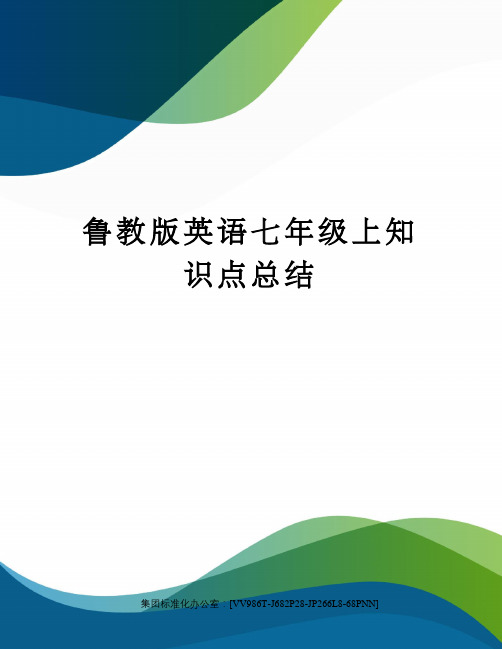
鲁教版英语七年级上知识点总结集团标准化办公室:[VV986T-J682P28-JP266L8-68PNN]语法知识1.现在进行时态:结构:主语+be动词+动词ing+其他2.现在分词的构成规则如下:1)一般动词后直接加-ing.如:reading,watching,seeing2)以不发音的e结尾的词去掉e再加-ing.如:make—makingwrite—writing3)以重读、闭音、单辅音字母结尾的词,双写这个辅音字母,再加-ing.如:get-gettingswim-swimmingput-puttingrun-running3.用法:1)表示现在(说话瞬间)正在进行或发生的动作。
(不能指状态。
)2)表示现阶段正在进行,而此刻不一定在进行的动作。
(以thesedays为代表)3)表即将发生的动作。
这类词有:come,go,leave,arrive等,常与表将来的时间状语连用。
4.常见标志:1)句中有:now,atthemoment,thesedays,look,listen等如:Heisdoinghishomeworknow.Look,whatisthegirldrawing?5.现在进行时的一般疑问句及回答:一般疑问句把be动词提前;回答用Yes,主语+be或No,主语+be+no t。
如:Areyoumakingthebed?Yes,Iam.Isthegirldrawingapicture?No,sheisn’t.6.现在进行时的否定句:在be动词后加not。
如:Theyarecleaningtheclassroom.→Theyaren’tcleaningtheclassroom.7.对现在进行时的谓语动词提问,常用“what…doing”。
如:Heisreadingabook.→Whatishedoin g.重点词组waitfor 等候talkto 与……谈话talkabout 谈论gotothemovies 去看电影writealetter 写一封信readingabook 看书hereisaphotoofmyfamily.这是我家的一张照片inthenextphoto在下张照片上playbasketball?打篮球watchTV看电视playcomputergames?玩电脑游戏takephotos?照相playtheguitar?弹吉他haveagoodtime=havefun=haveagoodtime玩的开心重点句子1.Whatareyou/theydoing你们/他们在做什么2.3.Whatishe/shedoing他/她在做什么4.5.I'mwatchingTV.我正在看电视。
鲁教版(五四学制)七年级上册英语期末复习各单元知识点提纲(实用,必备!)
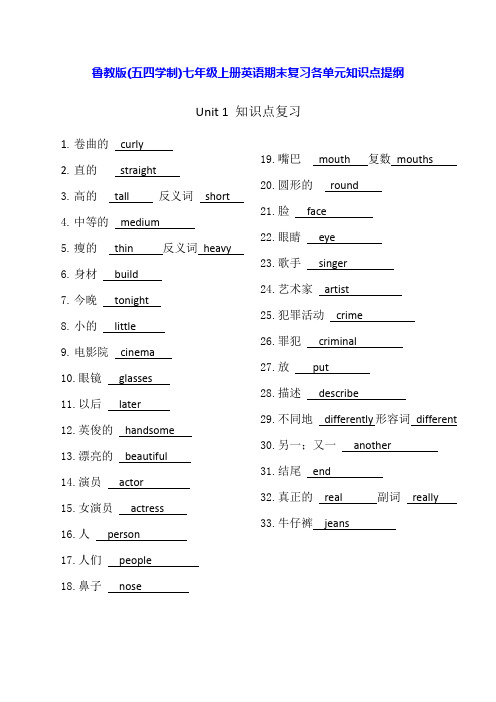
鲁教版(五四学制)七年级上册英语期末复习各单元知识点提纲Unit 1 知识点复习Unit 2 知识点整理短语必备1.散步went for a walk2.挤奶milked a cow3.喂鸡fed chickens4.骑马rode a horse5.拍照took some photos6.很多quite a lot7.太多乐趣so much fun 8.带领某人参观show sb. around 9. 和农民交谈talked with a farmer 10.你真幸运lucky you11.出现come out 12.在乡下in the countryside13.在晚上看星星watch the stars at night 14.去钓鱼went fishing 15.爬山climb a mountain 16.参观消防站visit a fire station 17.沿途along the way 18.令人兴奋的一天an exciting day19..学了很多关于机器人的知识learn a lot about robots20.教我们如何制作机器人模型taught us how to make a model robot21.给某人买某物buy sth for sb.=buy sb. sth22. 太多人too many people 23.总的说来all in all24..一点也不not at all 25.下象棋play chess26.对...感兴趣be interested in 对...不感兴趣be not interested in句子必会1.-你看到奶牛了吗?Did you see any cows?-是的;我看到了很多。
Yes,I did.I saw quite a lot.2.卡罗尔摘了一些草莓并且把它们带回了家。
Carol picked some strawberries and took them home.3.随后,导游教我们如何做机器人模型。
鲁教版七年级上册英语知识总结
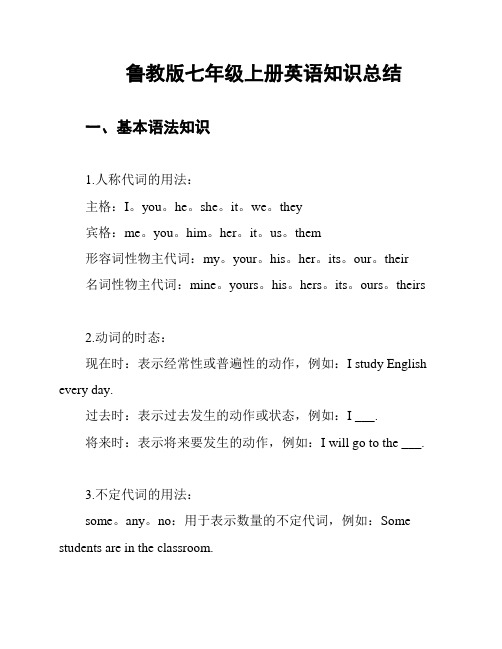
鲁教版七年级上册英语知识总结一、基本语法知识1.人称代词的用法:主格:I。
you。
he。
she。
it。
we。
they宾格:me。
you。
him。
her。
it。
us。
them形容词性物主代词:my。
your。
his。
her。
its。
our。
their名词性物主代词:mine。
yours。
his。
hers。
its。
ours。
theirs2.动词的时态:现在时:表示经常性或普遍性的动作,例如:I study English every day.过去时:表示过去发生的动作或状态,例如:I ___.将来时:表示将来要发生的动作,例如:I will go to the ___.3.不定代词的用法:some。
any。
no:用于表示数量的不定代词,例如:Some students are in the classroom.something。
anything。
nothing:用于表示事物的不定代词,例如:I have something to tell you.___。
anybody。
___:用于表示人的不定代词,例如:___.二、常用词汇和短语1.问候语:Good morning。
早上好!Good afternoon。
下午好!Good evening。
晚上好!How are you。
你好吗?Nice to meet you。
很高兴见到你!2.数字和时间:数字:one。
two。
three。
four。
five。
six。
seven。
eight。
nine。
ten时间:morning。
afternoon。
evening。
night3.家庭成员:爸爸:father。
dad妈妈:___。
mom哥哥:___弟弟:___姐姐:older sister妹妹:younger sister三、常用句型和对话1.介绍自己:My name is [name]。
I'm [age] years old.I have [hair color] hair and [eye color] eyes. ___ [subject].I like [hobby]。
鲁教版七年级上英语各单元重要概念总结
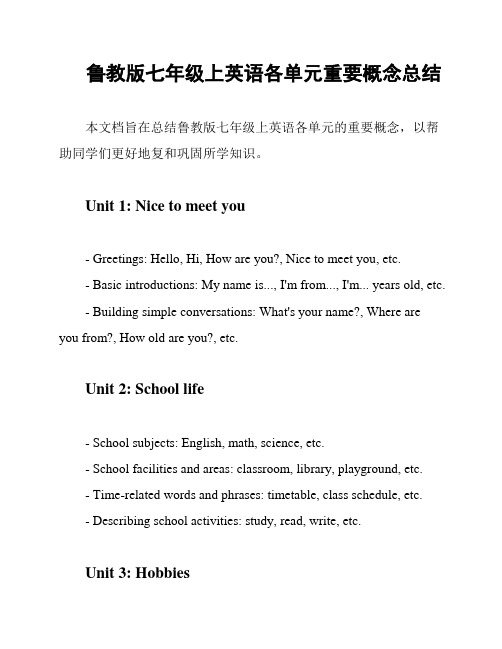
鲁教版七年级上英语各单元重要概念总结本文档旨在总结鲁教版七年级上英语各单元的重要概念,以帮助同学们更好地复和巩固所学知识。
Unit 1: Nice to meet you- Greetings: Hello, Hi, How are you?, Nice to meet you, etc.- Basic introductions: My name is..., I'm from..., I'm... years old, etc.- Building simple conversations: What's your name?, Where are you from?, How old are you?, etc.Unit 2: School life- School subjects: English, math, science, etc.- School facilities and areas: classroom, library, playground, etc.- Time-related words and phrases: timetable, class schedule, etc.- Describing school activities: study, read, write, etc.Unit 3: Hobbies- Leisure activities: play sports, listen to music, watch movies, etc.- Expressing likes and dislikes: I like..., I don't like..., etc.- Talking about frequency: always, usually, sometimes, etc.Unit 4: At home- Home and rooms: living room, bedroom, kitchen, etc.- Furniture and household items: table, chair, bed, etc.- Describing home activities: cook, clean, watch TV, etc.- Simple prepositions: in, on, under, etc.Unit 5: My family- Vocabulary related to family members: father, mother, brother, etc.- Describing family relationships: He is my father, She is my sister, etc.- Talking about family members' occupations: My dad is a doctor, etc.Unit 6: Food and drinks- Food and beverages: rice, noodles, milk, water, etc.- Talking about preferences: I like..., I don't like..., etc.- Expressing hunger and thirst: I'm hungry/thirsty, etc.Unit 7: Daily routines- Daily activities: get up, have breakfast, go to school, etc.- Adverbs of frequency: always, usually, sometimes, etc.- Describing the time: morning, afternoon, evening, etc. Unit 8: Weather- Weather conditions: sunny, rainy, cloudy, etc.- Talking about the seasons: spring, summer, fall, winter, etc. - Describing the temperature: hot, cold, warm, etc.以上是鲁教版七年级上英语各单元的重要概念总结。
七年级上英语鲁教版知识点

七年级上英语鲁教版知识点
一、单词拼写
1. 常见的日常生活单词
2. 根据音标拼写单词
3. 主要的英语数字和时间表达方式
二、基本语法
1. 一般现在时的肯定句、否定句和疑问句
2. 一般过去时的肯定句、否定句和疑问句
3. 现在进行时的句子结构和用法介绍
三、交际用语
1. 日常问候和交际用语
2. 约会和邀请用语
3. 赞美和感谢用语
四、常用句型
1. “There be”句型的用法和构成方式
2. “Do you like…”和“Does he/she like…”句型的用法
3. “How often do you…”句型的用法
五、阅读理解
1. 短文阅读和理解
2. 根据上下文判断单词意思
3. 根据短文填空和选择题
以上是七年级上英语鲁教版的主要知识点,掌握了这些知识,英语学习的基础就打下了坚实的基础。
在学习的过程中,要注重练习和积累词汇量,并结合实际生活中的场景进行练习,培养英语思维和语感,才能更好地理解和应用英语知识。
加油!。
初一英语上册鲁教版知识点总结
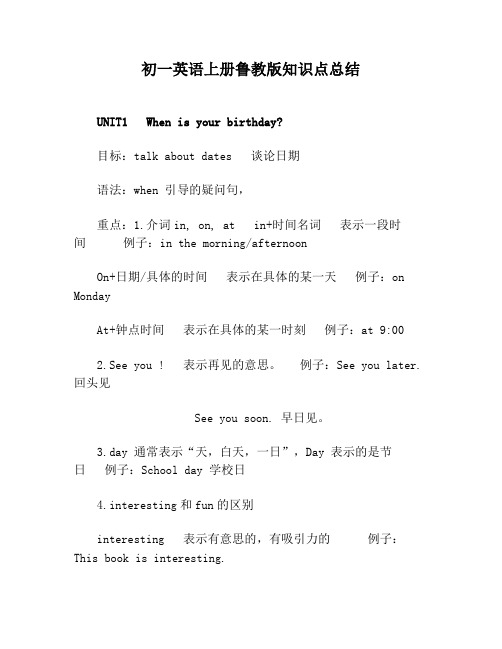
初一英语上册鲁教版知识点总结UNIT1 When is your birthday?目标:talk about dates 谈论日期语法:when 引导的疑问句,重点:1.介词in, on, at in+时间名词表示一段时间例子:in the morning/afternoonOn+日期/具体的时间表示在具体的某一天例子:on MondayAt+钟点时间表示在具体的某一时刻例子:at 9:002.See you ! 表示再见的意思。
例子:See you later. 回头见See you soon. 早日见。
3.day 通常表示“天,白天,一日”,Day 表示的是节日例子:School day 学校日4.interesting和fun的区别interesting 表示有意思的,有吸引力的例子:This book is interesting.Fun 表示有趣的,使人快乐的例子:This book makes me fun.5.can 表示可以,能够情态动词UNIT2 My favorite subject is science.目标:谈论表现,给出理由语法:what who why引导的疑问句,给出相对应的答案重点:1.How’s your day ?朋友见面时的打招呼2.have+学科表示上某一学科的课例子:have math 上数学课3.the next day 表示接下来的一天,第二天例子:We will have a game the next day .4.That’s for sure.正确,是真的,确实如此。
例子:Tom is beautiful. That’s for sure.5.from...to... 表示从...到... 描述时间地点的范围例子:from Monday to Friday6.书信的格式:开头人名前要加Dear 落款加your friend7. Class和lesson的区别:两者都可以表示学校的课,但是lesson表示有技巧的课,教材中的教学单元,比如 dance lessons 舞蹈课lesson1 第一单元UNIT3 Can you play the guitar?目标:谈论能力语法:Can 引导的疑问句重点:join表示参加社团和组织例子:join the CBA 加入CBAPlay+球类运动例子:play basketballPlay+the+乐器例子:play the guitarBe good at doing 表示擅长。
- 1、下载文档前请自行甄别文档内容的完整性,平台不提供额外的编辑、内容补充、找答案等附加服务。
- 2、"仅部分预览"的文档,不可在线预览部分如存在完整性等问题,可反馈申请退款(可完整预览的文档不适用该条件!)。
- 3、如文档侵犯您的权益,请联系客服反馈,我们会尽快为您处理(人工客服工作时间:9:00-18:30)。
鲁教版七年级上英语各单元重点短语和句子汇编Unit1 单元词组句子汇总1、 look like=be like看起来像……..2、have short/long/curly/straight black hair有短的/长的/卷的/黑的/头发3、be of medium height中等高度4、be of medium build 中等身材5、 a little 一点(修饰不可数名词)6、一名女演员。
an actor7、一名艺术家an artist8、最后 in the end9、一名警察艺术家a police artist10、小嘴 a small mouth11、一张圆脸a round face12、擅长…….. be good at13、同样的方式。
the same way14、在不同的学校in different schools15、这个罪犯的肖像。
the picture of the criminal16、每个老师each teacher17、他们中的每一个each of them18、不同地描述相同的罪犯describe the same criminal differently19、戴眼镜wear glasses20.大眼睛big eyes21、去电影院 go to the cinema22、一个大鼻子a big nose23、穿牛仔裤。
wear jeans24、放……在上面/里面put…..on/ in….25、我最喜欢的歌手。
my favorite singer26、一小时后。
an hour later27、具有长发的女孩the girl with long hair28、戴眼镜的演员 the actor with glasses29、了解他know him well30、一份有趣的工作an interesting job31、首先 first of all32、记得很好remember well33、在报纸中in newspapers34、在电视上on TV35、晚一点儿 a little late重点句子:1、他长相如何?What does he look like?他中等高度.. He is of medium height.2、你妈妈长什么样?What does your mother look like?她有长的直的金黄色的头发。
She has straight blonde hair. 3、他高还是矮?Is he tall or short?他不高不矮。
他中等高度。
He isn’t tall or short. He is of medium height.4、他们长相如何?What do they look like?他们中等身材。
They are of medium build.5、他们告诉他罪犯长相如何。
They tell him what the criminal looks like.6、我喜欢他因为他很潇洒,并且擅长踢足球。
I like him because he is very handsome, and he is good at playing soccer.7、我们中每一个都喜欢他。
Each of us likes him.8、让我告诉你他长相如何。
Let me tell you what he looks like.9、他又高又胖。
并且大约30岁 .He is tall and heavy. And he is about thirty years old.10、我可能晚点儿。
I may be a little late.11、她通常穿牛仔裤。
She usually wears jeans.12、戴眼镜的女孩是我妹妹。
The girl with glasses is my sister.13、他想画每个罪犯的优秀的肖像。
He wants to draw a good picture of the criminal.14、今晚你将去看电影吗?Are you going to the movie tonight?Unit2 重点句子讲解Section A1、Are there any vegetables in the beef noodles? 牛肉里面有一些蔬菜吗?1)there be 结构的一般疑问句构成为“Is/Are there+ 某地+ 某物?”,句中的be(is/are) 和后面的名词在数上保持一致;回答用“Yes, there is/are.”或“No, there isn’t/ aren’t.”。
如:—Is there any meat in the soup? 汤里有肉吗?—No, there isn’t. 不,没有。
2)beef “牛肉”,不可数名词。
此句中beef作noodles的定语。
当一个名词在另一个名词前充当定语时,起修饰作用的名称通常用单数形式。
如:two apple trees 两颗苹果树拓展:man和woman作定语时,要和所修饰的名词的单复数保持一致。
如:two women teachers 两位女老师2. What kind of noodles would you like? 你想要哪种面条?What kind of ...? 用来询问种类,of后面的名词可以是可数名词,也可以是不可数名词。
如:What kind of movies do you like? 你喜欢什么类型的电影?What kind of milk do you like? 你喜欢哪种牛奶?衔接:kind为可数名词,意为“种类”,a kind of……一种……拓展:kind 作形容词,意为“友好的,慈爱的”。
3. What size would you like? 你想要多大碗的(面条)?What size ...? 用来询问“大小;尺寸”。
如:What size of shoes would you like? 您想要多大号的鞋?4. May I take your order? 请问您可以点菜了吗?这句话是餐馆里服务员的常用语。
order在此处作可数名词,意为“点菜,订购”。
order也可以作动词,意为“点菜,预定”。
如:She wants to order some bread. 她想要一些面包。
5. We’d also like gongbao chicken and some mapo tofu with rice. 我们也想要宫保鸡丁和一些带有米饭的麻婆豆腐。
with介词,意为“带有,具有”,介词短语with rice在句中作后置定语,修饰名词tofu.a house with six rooms 有六个房间的房子Section B6. I don’t like onions, green tea or porridge. 我不喜欢洋葱,绿茶和稀饭。
and, or都是并列连词,用来连接并列成分,意为“和”, and用于肯定句中, or用于否定句中。
如:I like meat and eggs. 我喜欢肉和鸡蛋。
She doesn’t like soup or tea. 她不喜欢汤和茶。
【衔接】or还可以用于引出另一种可能,表示选择,意为“或;或者;还是”。
如:Which coat do you like, the red one or the yellow one?7. The answer would be different in different countries.在不同的国家将会有不同的答案。
1)answer在此处是可数名词,意为“答案,回答”,后面常接介词to,表示“……的答案”。
如:the answer to the question 问题的答案拓展:answer还可以作动词,意为“回答”。
Please answer the question. 请回答问题。
2)different 形容词,不同的。
句中第一个different作表语,第二个different作定语。
表示“与……不同”,用be different from……如:My pen is different from yours. 我的钢笔和你的不同。
8. The number of candles is the person’s age. 蜡烛的数量是这个人的年龄。
the number of “……的数量”,后跟复数名词,作主语时谓语动词用单数。
如:The number of students in my class is 50.我们班的学生数量是50.9. The birthday person must make a wish and blow out the candles.过生日的人要许个愿望并吹灭蜡烛。
wish在此处作可数名词,意为“心愿,愿望”,make a wish意为“许愿”。
如:My wish is to become a teacher. 我的愿望是当一名教师。
Best wishes to you.blow为不及物动词,blow out “吹灭”。
如:The wind is blowing hard. 风很大。
10. If he or she blows out all the candles in one go, the wish will come true.如果他或她一口气把蜡烛全部吹灭的话,许下的愿望就会实现。
本句为if引导的条件状语从句。
in one go意为“一口气”,go在此处作名词,常用于口语。
11. In China, it is getting popular to have cake on your birthday.在中国,过生日时吃蛋糕正在变得流行。
1)句中it为形式主语,真正的主语是后面的动词不定式短语。
2)popular 形容词,“受欢迎的,流行的”。
在句中作表语或定语。
get popular意为“变得流行”。
如:She is very popular in China. 她在中国非常受欢迎。
popular songs 流行歌曲12. They never cut up the noodles because the long noodles area symbol of long life.他们从不切断面条,因为长面条是长寿的象征。
cut up 意为“切碎,切断”。
如:cut up the vegetables 把菜切碎13. All of these birthday foods may be different, but the ideas are the same.所有这些生日食品可能会有所不同,但是想法是相同的。
